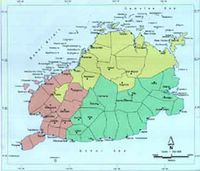DTI assures price watch to boost money power
Will the reported pay hikes be enough to boost the purchasing power of consumers in an economic crunch?
If not, then the local Department of Trade and Industry (DTI) said no unreasonable price increases of basic goods should happen, to allow consumers to mount the rising tide of prices in basic commodities.
Concordia Erano of the local DTI price monitoring team claimed that assuring people of fair prices [in basic goods] is the best thing they can do, so a tight price watch is in order.
DTI is now warning unscrupulous businessmen who overprice basic commodities.
An overprice which is essentially profiteering is pricing goods more than 10% of its average price in the preceding month, states Republic Act 7581.
Consumers have been wary about price increases following weekly price adjustments in fuel and petroleum products.
“This should not be enough reason for entrepreneurs to get opportunistic,” DTI said. To keep the tags in these things, Erano reported that the DTI is poised for another round of price monitoring activities, in an effort to implement the law so that prices will remain stable and good available to the consuming public.
Opportunists could get between a month to 5 months in jail or a penalty of P1T to a million when caught profiteering. The law also provides tougher penalties for overpricing basic goods.
The country has noted weekly adjustments of 50 centavos on petroleum prices recently. The DTI monitoring activities will put price coordinating council members in markets to make sure that any movement [in price] is justified.
This, following reports that daily wage earners are expected to get pay hikes starting June 1. State workers on the other hand are reported to get 10% salary increases by the following month.
On this, Labor Secretary Marianito Roque assured the June wage hike for daily wage earners, as regional wage boards are expected to decide how much, by mid-May.
Roque also cited the mandatory 15-day publication of rates before the wage hike is implemented.
Every last week, Pres. Gloria Macapagal Arroyo (PGMA) instructed Rgional Wage Boards to work overtime to finally set the rates of increase in the respective regions.
By law, the government set up the tripartite wage boards to determine the cost of living in areas so as not to kill investors who choose to put up country side businesses for cheaper costs. This also happens just as the President urged companies to package non-wage benefits for workers while the government was yet to decide on the raise by May 1, Labor Day.
“Non-wage benefits are non-taxable, so workers tend to enjoy it to the hilt,” Malacanang was once quoted as saying
For state workers, PGMA has recently okayed the 10% basic raise when she signed an executive order to that effect lately.
The fund has been incorporated in the 2008 national budget, which legislators passed. The allocation also included P41B share for state workers’ miscellaneous benefits.
As to the executive order, Budget Secretary Rolando Andaya Jr. said it would be similar to last year’s issuance which granted civilian employees of the national government a 10% increase in their basic salary.
Last year’s EO granted a P1,200 increase in the monthly subsistence and other allowances of policemen, soldiers and other uniformed personnel.
As to the June raise in daily wage earners’ pay, the National wage Productivity Board believes it should not cause layoffs or businesses to close.
“The basic pay hike is expected to have minimal effects on inflation rate and business since there are only 2.7 million minimum wage earners,” it said.
Much earlier still, the National Economic and Development Authority (NEDA), in a study bared that a big across-the-board wage increase would have a devastating effect on businesses.
The same study revealed that some 800, 000 to 900,000 workers might be laid of if a significant across-the-board wage increase is implemented.


0 Comments:
Post a Comment
Subscribe to Post Comments [Atom]
<< Home